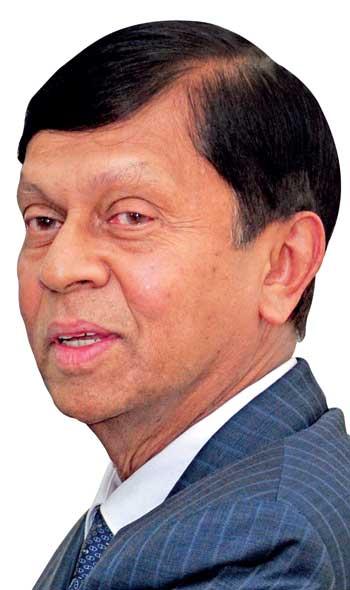Out-of-the-box thinking is the need of the moment – Ajith Nivard Cabraal
Posted on July 31st, 2020
Courtesy The Daily Mirror
I think what is most important is proper debt management. If we get that right, we don’t need to think of debt restructuring

The Daily Mirror discussed the impact of the COVID 19 pandemic on the national economy and how Sri Lanka could emerge from this unprecedented challenge with the least possible damage, with former Central Bank Governor, senior advisor to Prime Minister on economic affairs and SLPP National List candidate, Ajith Nivard Cabraal.
Excerpts:
Q What exactly is the nature of damage done to the economy by the pandemic?
As we all know, the pandemic caused a massive shut-down of economic activities, globally. As a result, many industries suffered. Transportation by air, sea and road came to an almost complete halt. Tourism was severely affected. Many factories closed without work. Many also didn’t get paid for the goods they produced and sold because the buyers were so badly affected. Global oil prices plunged. In that scenario, the Sri Lankan economy suffered a serious setback because exports of apparels as well as tourism which were two of the key foreign exchange earners in our country, were seriously affected. The lockdown, while helping to control the spread of the virus, naturally led to a major slowdown in purchasing power which further affected all businesses, big and small. Many in the private sector lost livelihoods and jobs, hopefully temporarily.
Even though difficult, the government was able to prop up several sectors as well as the affected people to some extent. Nevertheless, the significant reduction in consumer demand across the board, caused a serious contraction in the economy since the advent of the COVID -19 virus. Fortunately, the recovery is finally taking place worldwide and Sri Lanka opening out gradually, and businesses beginning to pick up. In that scenario, we now hope that the resumption of at least a reasonable degree of economic activities will enable the overall economy to record a V-shaped recovery by the fourth quarter of 2020, although that’s somewhat optimistic.

Q Though we have contained the pandemic, the world is yet to come out. Then, is it realistic for us, to realise the economic targets?
We need to develop some economic targets if we are to move forward. Otherwise, we will find it difficult to stay focused. We also need to make certain estimates now because such estimates would be needed to help position ourselves to meet the crisis in a reasonably professional manner. It is of course quite possible, that some of the estimates and assumptions that we make today, could later prove to be erroneous, but that is a risk that we will need to take at this time. We all need to acknowledge and understand that the entire world is moving on uncharted waters right now. The course is not clear, but yet, we have got to move forward. Otherwise, we would surely perish. The government too will have to think out-of-the-box and take some bold steps. Not every decision will be 100% accurate. But, in these circumstances, if no decisions are taken or no action is taken, business confidence will suffer and all economic stakeholders will enter into a very pessimistic mode, which will lead to disastrous results.
Even otherwise, it may slowly limp back, but that would take too long and the social fallout could be highly dangerous.
Q The industrial sector, tourist industry, Small and Medium Enterprises, rural and domestic industries are the most affected from COVID – 19. How can these vital segments of the economy be revived in the shortest possible period of time?
As already stated, almost all sectors of the economy have been affected due to the collapse of local and international demand. In that background, the greatest pain and vulnerability will be faced by businesses in the immediate and short term. That is why we have to give our country’s businesses the necessary support to tide over that difficult period. That is not going to be easy since the government finances are also stressed at this time as tax collections in the post-COVID period would be weak while foreign inflows too, will be interrupted.
Q Who are the most vulnerable sections in society that should be given priority in the government’s recovery programme?
There are several sectors that have been badly affected as a result of the fall in demand for various goods and services. The apparel and tourism sectors have been significantly affected in particular, and the persons who are involved in those sectors have become quite vulnerable. They certainly need to be supported until such time that those sectors recover. At the same time, there are several other local industries and services that have also suffered significantly as a result of the acute fall in local demand due to the lockdown and reduced purchasing power. Those persons too need to be supported by way of cash grants, tax breaks, loan and interest moratoriums, quick release of new loan facilities at concessionary interest rates. All these matters have received the consideration of the government, and solutions are being developed to provide the maximum support.
Q The largest contributions to Sri Lanka’s foreign reserves come from remittances of the expatriate Sri Lankan community, garment and apparel exports, fish exports and the exports of tea and rubber. At a time all the export revenues has dropped to a drip, what incentives could the government offer to rekindle these sectors?
If export revenue in a country drops due to quality issues or availability problems within the exporting country, then it could be fixed by taking the required management and operational remedial measures to rectify such issues. However, if the export revenue is declining due to the decreasing purchasing power of the importing nation’s people and business entities, the problem would be more challenging as it would be beyond the control of the exporter or the exporting country.
As is well known, in the case of many export-market collapses experienced in the last few months, it is clear that the decline is due to consumer demand in the importing country declining as a direct result of the COVID -19 situation. In that background, it is likely that the demand would pick up after a few more months, and therefore what would be important is for the exporting country to remain resilient by following policies that would enable its exporters to keep their factories and businesses intact, and survive until such time the downward trend changes.
In the case of exports of apparels, fish, tea, rubber, etc., we have already begun to see an improvement in export revenues. Therefore, it is now time for us to strive even harder to stimulate our existing markets and find new niche markets that would provide us with the opportunity to export more.
Further, although we do observe a reduction in remittances due to the purchasing power decline in the Middle Eastern countries, it is likely that once global demand picks up, oil prices would improve, which would be a favourable outcome from the point of view of the oil exporting nations. I think the government would do well to provide some short-term relief to those affected businesses until such time demand in the importing or employing nations reaches at least the pre-COVID levels.
Q How does the government plan for debt restructuring?
I think what is most important is proper debt management. If we get that right, we don’t need to think of debt restructuring. During the period I was the Governor from 2006 to 2014, we were able to reduce Sri Lanka’s Debt to GDP Ratio from 91% to 71%. We were able to shave 50% off the average interest rate of our debt stock. We were able to double the average time to maturity of the debt stock. By keeping the Rupee stable, we ensured that foreign debt servicing was manageable.
The impact of the COVID -19 economic contraction has thrown fresh challenges to debt management, and I believe this is not a matter that Sri Lanka must face as an individual country only. This is an extraordinary global condition that has been caused by a global occurrence, and as I said earlier, the world community must take a global approach to deal with the fallout. That’s why I have been advocating since April this year that the G7 countries get together with the IMF and the World Bank and take a holistic view and implement an across-the-board debt moratorium for all emerging nations for about two years. That would be a kind of an economic vaccination” that would help all countries and organisations to deal with one another, without having to continuously worry as to whether the other would suffer from debt issues.
May I also say that, just like individual companies or countries, the multi-lateral institutions too must think out-of-the-box to safeguard the global economy, and I hope that realisation will dawn soon.
Q How challenging is it to increase the government’s revenue following tax cuts and dwindling income generation activities during the shutdown?
Increasing the Government revenue at this current time will be very challenging. The traditional methods are not going to work. That is why I have been advocating some new ways and means to achieve the same objective. If, as an emerging nation, Sri Lanka, together with the other emerging nations, could work out a debt-standstill” on its dues for the next two years to the IMF and World Bank, that would save a large chunk of Forex from flowing out of the country. Further, if the EPF releases 20% of the member balances direct to the members themselves, about 2.5 million persons will benefit by an important cash inflow of around Rs.500 billion at this most difficult time, which will also stimulate the economy. If several global equity and venture capital funds can be tapped and those inflows are infused into our economy, the government won’t have to allocate expensive” government funds to stimulate the economy in the post COVID -19 period. We have got to think differently now. If we go along the same beaten track and search for solutions along that track, we will not be able to deliver results. If we try to deal with the issue of dwindling income by imposing new taxes and having more restrictions on businesses, that would also be a path to certain failure.
July 31st, 2020 at 5:54 pm
Does it mean that politicians must not associate with criminals, respect the rule of law of the country, when in power should not pardon criminals and murderers. That goes for any official. This too is thinking and behaving out of the box. I think all citizens must learn to think out of the utter stupid and corrupt box which is not in line with the civilized world we know of.